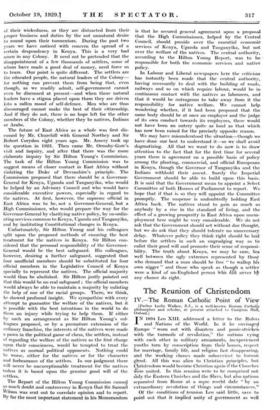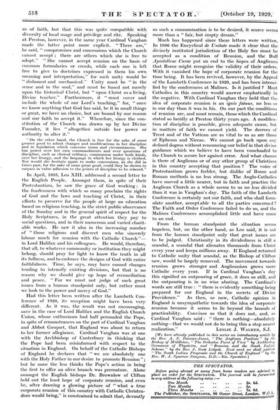The Reunion of Christendom
IV.—The Roman Catholic Point of View
[Father Leslie Walker, S.J., is a well-known Roman Cathode
philosopher and scholar, at present attached to Campion Rail, Oxford.] TN 1894 Leo XIII. addressed a letter to the Rulers -I- and Nations of the World. In it he envisaged Europe " worn out with disasters and panic-stricken with the turmoils of revolution,'' the nations vying with each other in military arniaments, inexperienced youths torn by conscription from their homes, respect for marriage, family life, and religion fast disappearing, and the working classes made Subservient to human geed. All this was alien to Christian principles, but Christendom would bedew Christian again it the Churches were united. In this reunion were to be comprised not Only the Eastern Chuiehes and the Slays, but also nations separated from Rome at a ms>re reedit date " by an extraordinary revolution of things and circumstances." Of the conditions of reunion Leo said little, save to point out that it implied unity of government as well as of faith, but that this was quite compatible with diversity of local usage and privilege and rite. Speaking at Preston, however, in the same year Cardinal Vaughan made the latter point more explicit.. " There are," he said, " compromises and concessions which the Church cannot accept ; there are others which she is free to adopt." " She cannot accept reunion on the basis of common formularies or creeds, while each one is left free to give to doctrines expressed in them his own meaning and interpretation," for such unity would be " dishonest and mechanical." Unity must be " in the sense and in the soul," and must be based not merely upon the historical Christ, but " Upon Christ as a Hiring, Divine teacher." Furthermore, it " must cover and include the whole of our Lord's teaching," for, " once we knOw anything that God has said, be it in small things or great, we have no choice, but are bound by our reason and our faith to accept it." Wherefore, since the con- stitution of the Church was drawn up by her Divine Founder, it lies " altogether outside her power or authority to alter it."
On the other hand, the Church is free for the sake of some greater good to admit changes and modifications in her discipline and in legislation which concerns times and circumstances. She has power over her own 'commandments -and over questions of discipline, such as clerical celibacy, communion under both kinds, over her liturgy, and the language in which her liturgy is clothed. Nor would she hesitate again to make concessions, as she did in times past, for the sake'of some great good, could they be shown to surpass m value adhesion to the points of discipline to be relaxed."
In April, 1895, Leo XIII. addressed a second letter to the English People. Amongst them, in spite of their Protestantism, he saw the grace of God working : in the fearlessness with which so many proclaim the rights of God and the laws and teaching of Christ, in their efforts to preserve for the people at large an education based on religious teaching, in the strict public observance of the Sunday and in the general spirit of respect for the Holy Scriptures, in the great attention they pay to social questions, and in their numerous and varied charit- able works. He saw it also in the increasing number of " those religious and discreet men who sincerely labour much for reunion with the Catholic Church "— in Lord Halifax and his colleagues. He would, therefore, that all, to whatever community or institution they might belong, should pray for light to know the truth in all its fullness, and to embrace the designs of God with entire faithfulness. Time, he says, may have caused changes tending to intensify existing divisions, but that is no reason why we should give up hope of reconciliation and peace. " For we must not judge of such great issues from a human standpoint only, but rather must we look to the power and mercy of God."
Had this letter been written after the Lambeth Con- ference of 1920, its reception might have been very different. As it was, the result was not encouraging, save in the case of Lord Halifax and the English Church Union, whose enthusiasm had half persuaded the Pope, in spite of remonstrances on the part of Cardinal Vaughan and Abbot Gasquet, that England was about to return to her former allegiance. Cardinal Vaughan was at one with the Archbishop of Canterbury in thinking that the Pope had been misinformed with respect to the situation in England. On behalf of the Catholic Bishops of England he declares that " we are absolutely one with the Holy. Father in our desire to promote Reunion "; but he none the less thinks the Pope's action in being the first to offer' an olive branch was premature. Alone amongst the English bishops Dr. Brownlow of Clifton held out the least hope of corporate reunion, and even he, after drawing a glowing picture of " what a true corporate reunion of this country with Catholic Christen- dom would bring," is constrained to admit that, devoutly as such a consummation is to be desired, it scarce seems more than a " fair, but empty dream."
Much has happened since these letters were written. In 1896 the Encyclical de Unitate made it clear that the divinely instituted jurisdiction • of the Holy See must be accepted as a eondition of Reunion,' and the Bull Apcistolicae Curse put an end to the hopes of Anglicans that Rome -might. recognize the validity of their orders. With it vanished the hope of corporate reunion for. the time being. It has been revived, however, by. the Appeal of the Lambeth Conference in 1920, and has been intensi- fied by the conferences at Malines. Is it justified?' Most Catholics in this country would answer emphatically in the negative. With Cardinal Vaughan they hold that the idea of corporate reunion is an ignis fatuus, no less so in our day than it was in. his On our part the conditions of reunion are, and must remain, those which the Cardinal stated so lucidly at Preston thirty years ago. A modifica- tion of discipline is possible, given adequate cause, but in matters of faith we cannot yield. The decrees of Trent and of the Vatican are as vital to us as are those of Ephesus and Niceae. We cannot go back upon any defined dogma without renouncing our belief in that divine guidance which we believe to have been vouchsafed to the Church to secure her against error. And what chance is there of Anglicans or of any other group of Christians in this country accepting that position ? The voice of Protestantism grows feebler, but dislike of Rome and Roman methods is no less strong. The Anglo-Catholics have moved a little nearer, but in faith and practice the Anglican Church as a whole seems to us no less divided than it was in Vaughan's day. The faith of the Lambeth Conference is certainly not our faith, and who shall form- ulate another, accept able • to all the parties concerned ? The Faith and Order Conference failed to do so, and the Malines Conferences accomplished little and have come to an end.
From the human standpoint the situation seems hopeless, but, on the other hand, as Leo said, it is not from the human standpoint only that great issues are to be judged. Christianity in its dividedness is still a scandal, a scandal that alienates thousands from Christ every year and keeps millions away. If England returned to Catholic unity that scandal, as the Bishop of Clifton saw, would be largely removed. The movement towards reunion grows stronger and Anglicanism grows more Catholic every year. If in Cardinal Vaughan's day this signified an outpouring of grace, it does so still, and the outpouring is in no wise abating. The Cardinal's words are still true : " there is evidently something being prepared for our England in the secrets. of Divine Providence." As then, so now, Catholic opinion in England is unsympathetic towards the idea of corporate reunion because it seems to lie beyond the bounds of practicability. Convince us that it does not, and, as Cardinal Vaughan said : " there is nothing—absolutely nothing—that we would not do to bring this a step nearer
[We have already published in this series an introductory article by the Rev. A. S. Duncan-Jones, " The Anglican Position" by the Bishop of Middleton, " The Orthodox Point of View" by Archbishop Germanos of Thyateira, and " Reunion and the South Indian Scheme" by the Rev. J. Scott Lidgett. Next week we shall publish " The South Indian Proposals and the Church of England ' by the Rev. W. J. Sparrow Simpson, D.D.—ED. Spectator.]























































 Previous page
Previous page